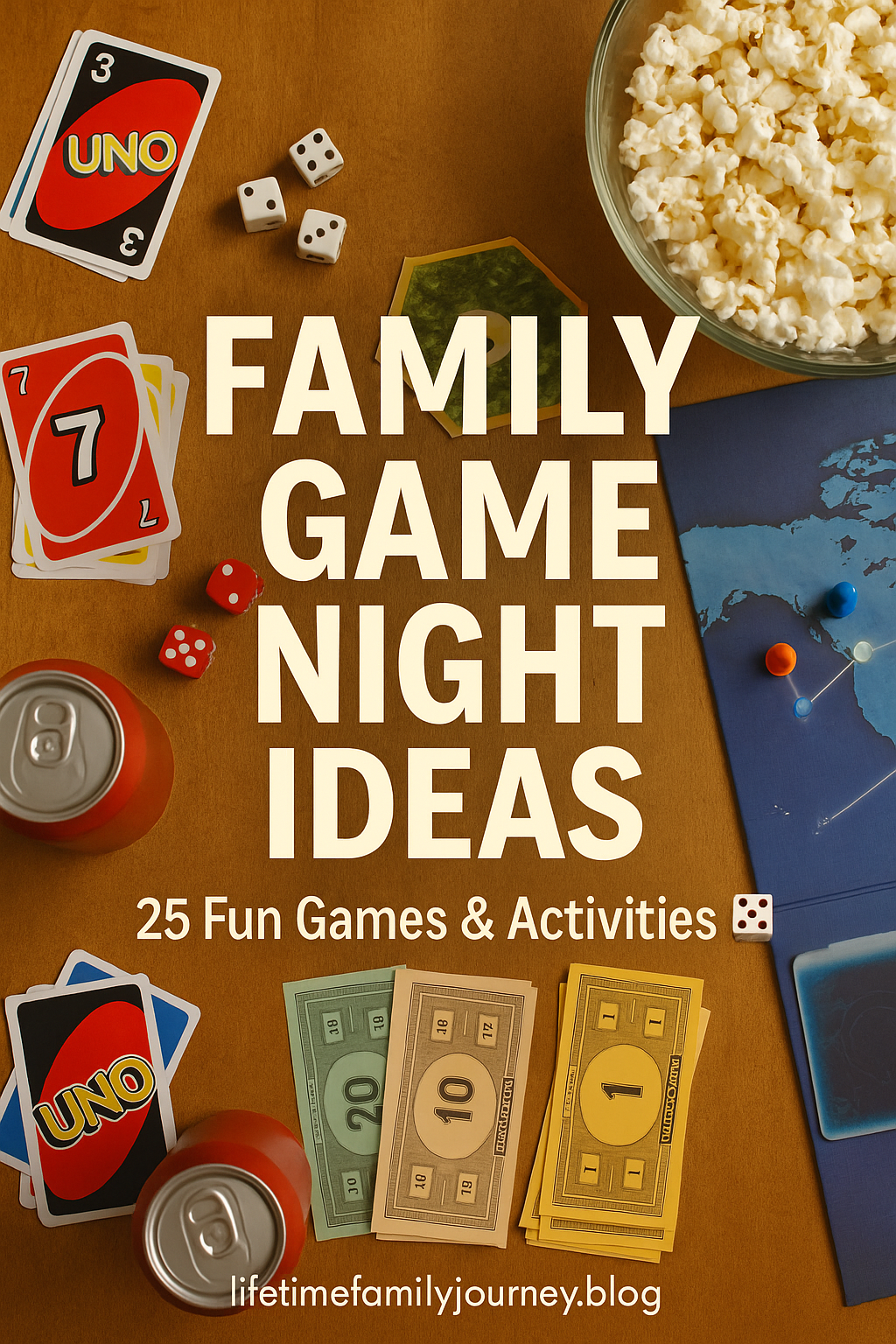Family Game Night Ideas: 25 Fun Games & Activities 🎲

The living room erupts in laughter as my 8-year-old daughter triumphantly places her final Uno card on the pile, leaving her teenage sisters scrambling with handfuls of cards. My son is already planning his revenge strategy for the next round, while my wife quietly shuffles the deck with that knowing smile parents get when chaos feels perfectly controlled.
This is what Thursday nights look like in our house—pure, unfiltered connection wrapped in friendly competition and way too many snacks. After raising six kids through countless phases, deployments, and the daily grind of military life, I’ve learned that some of our most meaningful moments happen around a simple card table.
Game night isn’t just entertainment—it’s intentional family building. In a world where everyone’s glued to individual screens, gathering around shared activities creates something screens can’t replicate: genuine interaction, problem-solving together, and memories that stick long after childhood ends.
Whether you’re looking to start a new tradition or refresh your current rotation, these family game night ideas will work for every age, personality, and household dynamic. From toddlers learning to take turns to teenagers actually choosing family time over their phones, there’s something here that’ll bring your crew together.
Finding the right family game night ideas can feel overwhelming with so many options available, but the key is starting simple and building from there.
Why Family Game Nights Matter ❤️
Let’s be honest—between school schedules, work demands, and the general chaos of raising humans, intentional family time doesn’t just happen. It requires planning, commitment, and sometimes bribing kids with their favorite snacks.
But here’s what I’ve discovered over 20+ years of parenting: when families play together regularly, everything else gets easier. Kids learn to handle disappointment when they lose, celebrate others’ wins, and navigate disagreements without completely melting down. These aren’t just game skills—they’re life skills disguised as fun.
Research from the American Academy of Pediatrics shows that regular family play time reduces screen dependency, improves communication skills, and strengthens family bonds in measurable ways. As parents, we also get something valuable: stress relief and genuine laughter with our kids, not just managing them.
✅ The magic happens when everyone’s guard is down. During competitive Monopoly moments or cooperative Pandemic sessions, kids share things they’d never mention during regular conversations. My teenagers have revealed crushes, friendship drama, and school stress while casually playing cards—conversations that might never happen otherwise.
Research from NC Cooperative Extension demonstrates that children from families who maintain regular game nights show measurable improvements across nearly every aspect of their lives: larger vocabularies by age two, higher reading scores from elementary through high school, increased school motivation, better peer relationships, and improved emotional well-being.
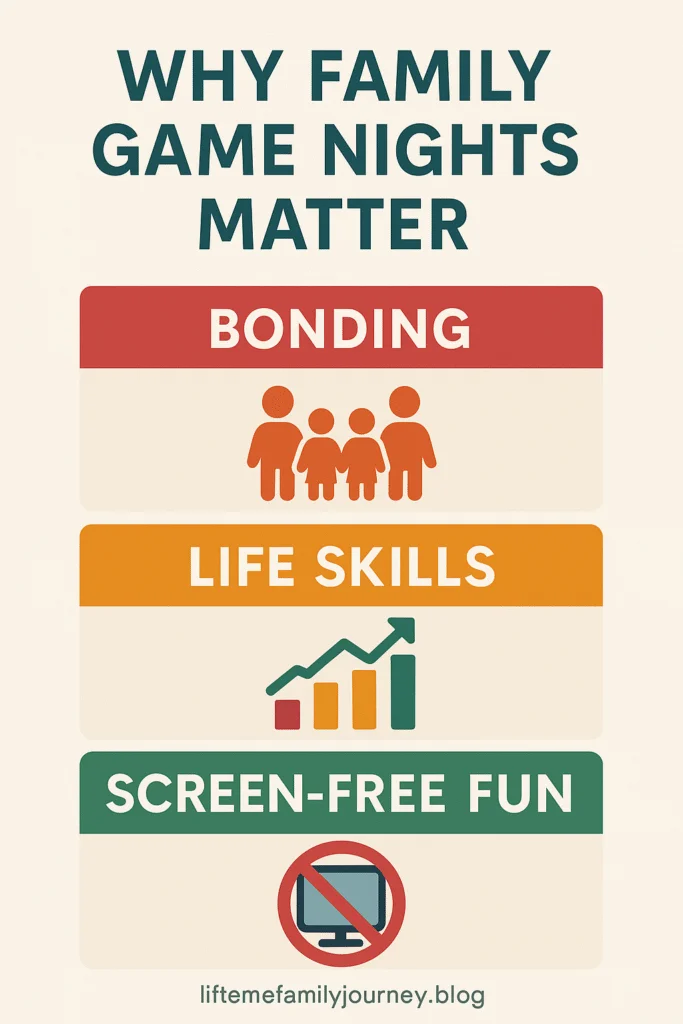
Building healthy family routines that include regular play time creates consistency kids can count on, especially during stressful seasons or major life changes.
Including All Ages at the Table 👶➡️🧑🎓
The biggest challenge for large families? Finding activities that work for toddlers AND teenagers without anyone feeling bored or overwhelmed. After years of trial and error (and some spectacular game night failures), I’ve learned the art of age-inclusive gaming.
👶 For toddlers and preschoolers (2-5 years):
- Simple matching games and color dice
- Basic card activities like Go Fish with pictures
- Candyland and memory games
- Focus: turn-taking, following rules, and patience
🎒 Elementary kids (6-10 years) thrive with:
- Uno, Jenga, Guess Who, Connect 4
- Simple strategy games they can “almost” master
- Games that make them feel grown-up alongside older siblings
- Occasional rule help without feeling babied
🎓 Tweens and teens (11+ years) engage with:
- Settlers of Catan, Pandemic, Ticket to Ride
- Jackbox party games for group laughs
- Strategy games that challenge developing critical thinking
- Activities that don’t feel “babyish” or dumbed-down
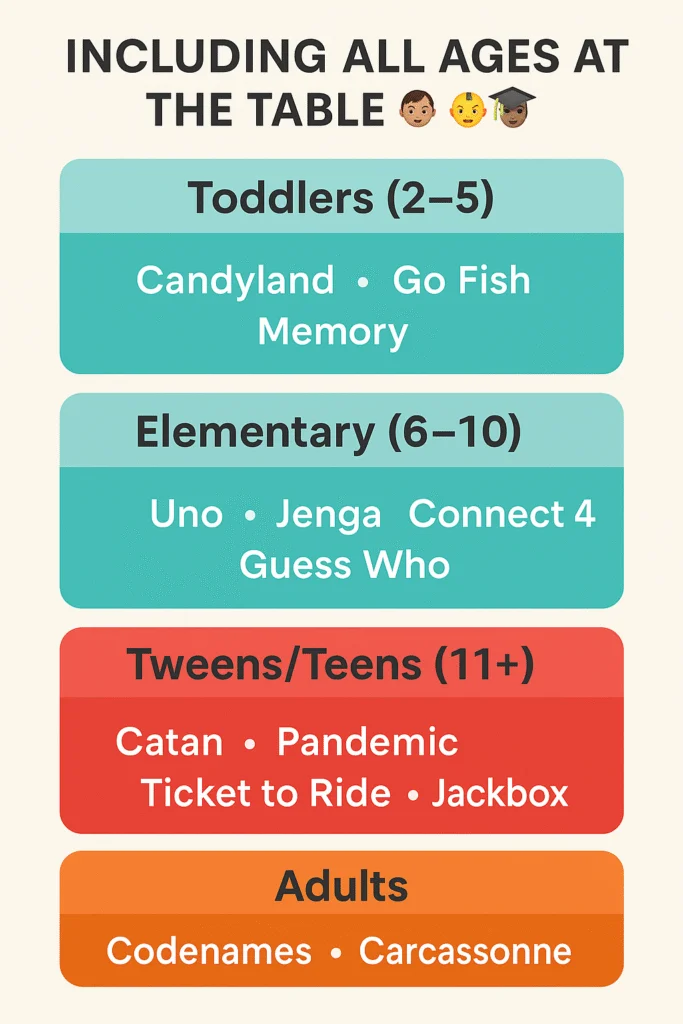
🎯 The secret weapon? Tiered teams. Pair older kids with younger siblings, rotate partnerships, and let everyone contribute their strengths. My 16-year-old daughter becomes incredibly patient when she’s helping her little brother understand Monopoly strategy—moments that build sibling bonds naturally.
Adults need to balance competitiveness with fun. Yes, we want to model good sportsmanship, but letting a 5-year-old win every single game teaches them nothing about resilience. Find that sweet spot where everyone has a genuine chance to succeed.
Making Game Nights Inclusive for Neurodivergent Kids 🧩
Three of my six kids have ADHD, autism, or other learning differences, so our family game night ideas had to evolve beyond typical approaches. Traditional games can feel overwhelming or frustrating for neurodivergent children, but with simple adaptations, everyone can participate meaningfully.

🧠 For kids with ADHD:
- Choose shorter games (15-30 minutes max)
- Build in movement breaks between rounds
- Rotate roles frequently (scorekeeper, card dealer, snack distributor)
- Use visual timers to show game progress
🌟 For children on the autism spectrum:
- Provide clear, consistent rules written down or visually displayed
- Allow sensory breaks when needed
- Create predictable game night routines (same day, same time, same setup process)
- Offer alternative participation roles if direct competition feels overwhelming
💡 Cooperative games like Pandemic or Forbidden Island remove the pressure of winning/losing while still providing engaging challenges. Instead of competing against each other, the entire family works together against the game itself—perfect for kids who struggle with competition.

These family game night ideas reduce pressure while still providing engaging challenges for kids who struggle with traditional competitive games.
Consider giving neurodivergent children special roles that play to their strengths: the rule keeper, the scorekeeper, or the snack coordinator. These responsibilities provide structure and importance without the social pressure of direct competition.
Communication struggles in autistic children often improve during structured game play because the rules provide clear social frameworks for interaction.
Classic Board & Card Games That Still Work ♟️
Before diving into trendy new games, let’s acknowledge the classics that have survived decades for good reasons. These family game night ideas have stood the test of time because they balance simplicity with engagement across age groups.
Monopoly remains the ultimate family bonding (and arguing) experience. Yes, it takes forever. Yes, someone always gets emotionally invested in their hotel empire. Yes, the bank somehow always ends up short on money (I’m looking at you, middle daughter who keeps “borrowing” hundreds for snacks). But it teaches money management, negotiation, and strategic thinking in ways kids actually remember.
Clue develops logical reasoning and deduction skills while letting kids feel like detectives. My younger kids love the story element—who killed Mr. Boddy and where?—while older ones enjoy the strategic elimination process.
The Game of Life sparks conversations about careers, family choices, and life paths in age-appropriate ways. It’s fascinating (and slightly terrifying) to hear what my teenagers think about different life decisions when they’re just spinning wheels and moving pieces. Apparently, becoming a doctor is “boring” but being a race car driver is “totally realistic.”
📌 Card game classics include:
- Uno: Easy to learn, impossible to master, perfect for building friendly rivalry
- Phase 10: More complex than Uno but manageable for elementary-age kids
- Skip-Bo: Great for number recognition and sequencing skills
- Go Fish: The ultimate starter card game for preschoolers
The beauty of classics is their flexibility. House rules are not only acceptable—they’re encouraged. We’ve modified Monopoly to finish in an hour, created Clue variations with family members as characters, and invented Uno challenges that keep everyone engaged.
These proven family game night ideas have entertained generations because they balance accessibility with lasting appeal.
Why classics work: they’re predictable enough for younger kids to follow but complex enough to remain interesting as children grow. Plus, parents already know the rules, eliminating the learning curve that comes with modern games (and the inevitable “Mom, you’re doing it wrong” comments from kids who actually read instructions).

Modern Strategy & Cooperative Games 🎯
While classics provide familiar comfort, modern board games have revolutionized family gaming with innovative mechanics, shorter play times, and cooperative elements that reduce conflict while increasing engagement.
When searching for fresh family game night ideas, modern games offer sophisticated options that grow with your children’s developing abilities.
Settlers of Catan introduces resource trading and strategic planning without overwhelming complexity. Kids learn negotiation, risk assessment, and adaptation when their carefully planned strategies get blocked by other players. The variable board setup means every game feels fresh.
Pandemic might be our family’s favorite cooperative game. Working together to save the world from diseases creates natural teamwork and shared problem-solving. There’s something powerful about celebrating victories together instead of individual wins—especially for competitive siblings who usually clash during games.
Ticket to Ride combines geography learning with strategic route building. Even my youngest kids can participate by collecting colored train cards while older players focus on connecting cities and blocking opponents’ routes.
🎯 Carcassonne offers tile-laying strategy that’s simple to learn but engaging for hours. Players build the French countryside together while scoring points for completing cities, roads, and monasteries. The collaborative building aspect appeals to kids who love construction and creativity.
Azul and Splendor provide beautiful visual experiences with satisfying tile-collecting mechanics. These games teach pattern recognition, resource management, and planning ahead—all while creating something beautiful on the table.
🎯 Benefits of modern strategy games:
- Multiple paths to victory (unlike luck-based classics)
- Reward different types of thinking and planning
- Give every family member chances to succeed based on unique strengths
- Create engaging challenges that grow with players
➡️ Benefits of cooperative games include: reduced tears when someone loses, shared celebration of victories, and natural opportunities for kids to help each other succeed rather than compete destructively.
Family-Friendly Video Games 🎮
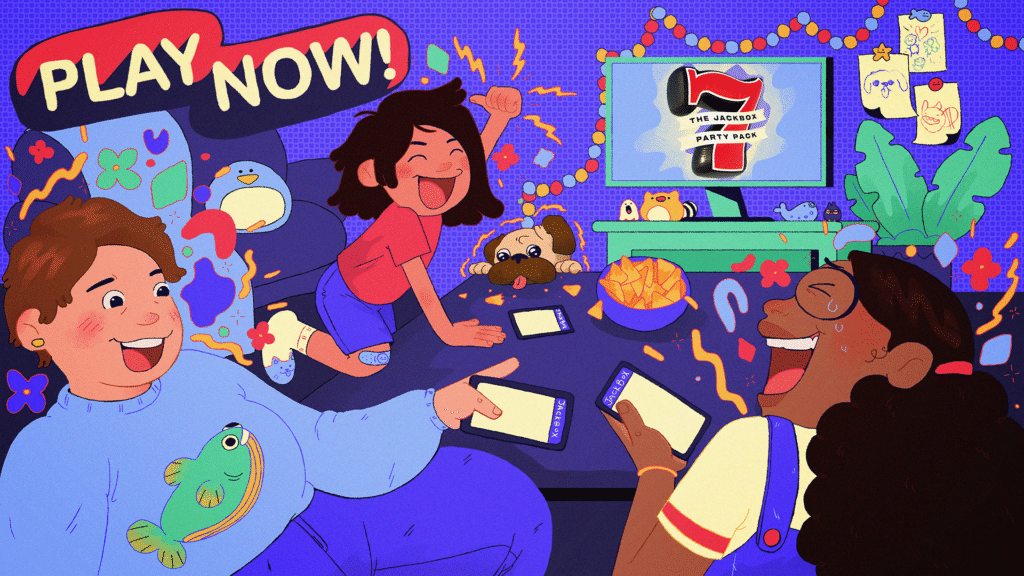
I know what you’re thinking—”Isn’t the point of family game night ideas to get AWAY from screens?” Not necessarily. The goal is intentional, shared family time, and some video games create exactly that better than traditional board games.
These digital family game night ideas prove that screens can enhance rather than replace meaningful family connection when used purposefully.
💡 Top screen-based family games:
- Minecraft Creative Mode: Digital LEGO with unlimited pieces (and no painful midnight stepping incidents)
- Jackbox Party Packs: Use phones as controllers, focus stays on TV screen
- Overcooked 2: Controlled chaos that teaches genuine teamwork
- Mario Kart: Quick competitive rounds perfect for shorter attention spans
- Among Us: Private family games teach deduction and strategic thinking

🚨 The key with screen-based family time is intentionality. We’re not passively consuming content—we’re actively creating shared experiences, solving problems together, and building memories that happen to use digital tools.
Fast & Funny Party Games 🎉
When attention spans are short or you need quick entertainment, party games provide instant engagement and guaranteed laughter. These family game night ideas require minimal setup but deliver maximum fun.
Quick party-style family game night ideas work perfectly when you need immediate entertainment without complex rules or lengthy setup times.
🎉 Party games that deliver instant fun:
• Charades: Scales perfectly—toddlers act out animals, teens tackle complex movie titles
• Pictionary reveals hidden artistic talents and creates hilarious misunderstandings. My kids still reference drawings from years ago that were so abstract they became inside jokes. Apparently, my attempt to draw “butterfly” looked like “angry taco,” and we’ve never let that go. The game works whether you’re Michelangelo or can barely draw stick figures (clearly, I fall into the latter category).
• Apples to Apples: Generates endless laughter through creative word combinations
• Telestrations: Combines drawing and guessing into telephone-style chaos
➡️ Parent vs. kids team competitions create natural excitement and engagement. Whether it’s trivia about family history, physical challenges, or creative contests, the generational divide becomes an advantage rather than a barrier.
These games work because they’re forgiving. Artistic skill, strategic thinking, and game experience matter less than creativity, humor, and willingness to be silly together. They’re perfect for including extended family, friends, or neighbors who join your family game nights occasionally.
DIY Games & Activities 🎨
Sometimes the best family game night ideas cost nothing and use materials you already have around the house. DIY games can be customized to your family’s interests, skill levels, and available time—plus kids love creating their own entertainment.
Creative family game night ideas using household materials prove that expensive games aren’t necessary for meaningful family bonding experiences.
🎨 DIY activities using household items:
- Indoor scavenger hunts: Search for “something that makes you smile” or “the oldest item in the living room”
- Minute-to-Win-It challenges: Stack plastic cups, transfer cotton balls with spoons, organize items by color
- Family trivia nights: Inside jokes, memories, and shared experiences become personalized entertainment
- Homemade bingo cards: Customize for household chores, foods tried, or funny family habits
- Living room obstacle courses: Use pillows, chairs, and ropes for creative physical challenges
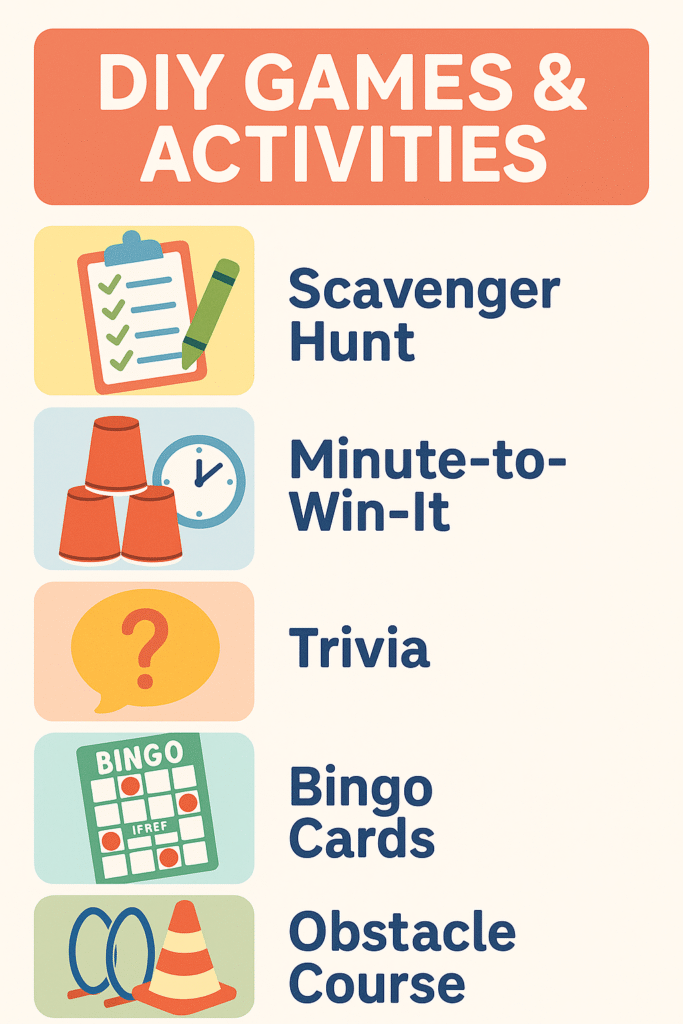
✅ The beauty of DIY activities is their flexibility and personalization. They can be modified in real-time based on energy levels, attention spans, and available materials, making them perfect backup options when other planned activities aren’t working.
Outdoor & Seasonal Game Nights 🌳☀️❄️
Family game night ideas shouldn’t be confined to living rooms and kitchen tables. Moving activities outdoors or adapting them to seasonal themes creates variety and excitement while taking advantage of different spaces and weather conditions.
Seasonal family game night ideas help families stay connected year-round while celebrating the unique opportunities each season provides for outdoor and themed activities.

🌞 Seasonal family game night ideas:
- Summer: Flashlight tag, water balloon games, backyard Olympics with relay races
- Fall: Pumpkin bowling, leaf scavenger hunts, outdoor chalk art with autumn themes
- Winter: Hot cocoa bars, cozy blanket forts, board games by the fireplace
- Spring: Sidewalk chalk Pictionary, outdoor scavenger hunts for signs of spring

➡️ Weather-appropriate game nights teach kids to adapt activities to circumstances while maintaining the core goal of family connection. They also provide natural conversation starters about seasons, weather, and environmental changes.
DIY kids room ideas can be adapted for creating seasonal game night spaces both indoors and outdoors, transforming regular areas into themed play environments.
Additionally, 25 genius home cleaning tips for large families often become more manageable after game nights because kids are in better moods and more cooperative with household responsibilities.
Tips for Parents to Keep Game Night Fun ✨
After countless game nights that ranged from magical bonding experiences to complete disasters involving tears, rule arguments, and premature bedtimes, I’ve learned what actually works to maintain fun family game night ideas consistently.
These practical family game night ideas help parents create sustainable traditions that actually work for busy families with mixed ages and energy levels.
✨ Essential parent strategies for successful game nights:
- Start small: Build momentum with shorter, easier games before attempting complex strategy games
- Rotate leadership: Let kids choose activities—they’re more invested when they have control
- Use game stations: Multiple activities running simultaneously accommodate different attention spans
- Embrace flexible rules: House rules that simplify or add challenges ensure everyone can participate meaningfully
- Keep snacks simple: Popcorn, pretzels, cut fruit won’t destroy game pieces when spilled
- Have backup plans: Quick 10-minute alternatives prevent game night from ending in frustration
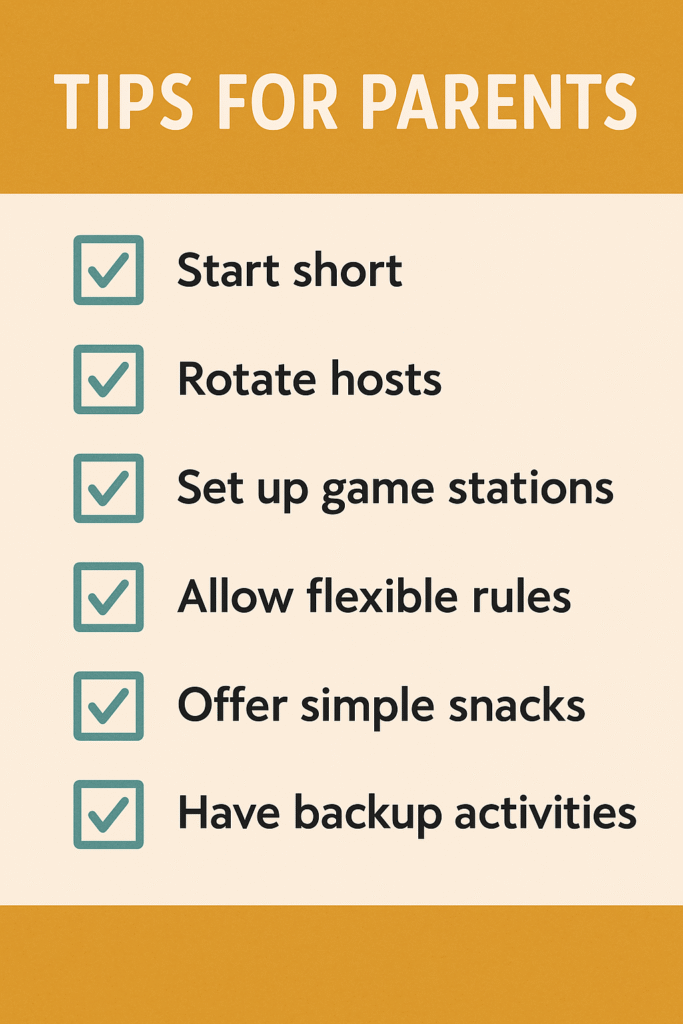
🎯 Focus on connection over competition. While winning and losing are important life lessons, the primary goal is enjoyable family time. Celebrate good plays by everyone, acknowledge improvement and effort, and model gracious winning and losing.
Turning Game Night Into a Family Tradition 🏡
The difference between occasional family game nights and lasting traditions lies in consistency, ritual, and evolution. Creating sustainable family game night ideas requires intentional planning and commitment, but the investment pays dividends in family relationships and childhood memories.
Successful family game night ideas become treasured traditions when parents approach them with realistic expectations and flexibility rather than perfectionist pressure.
🏡 Building lasting game night traditions:
- Consistency over frequency: Weekly vs monthly matters less than protected, predictable time
- Create small rituals: Special snacks, designated playlists, or personalized scorekeeping sheets
- Include teen friends occasionally: Structured family activities often appeal more than awkward hanging around
- Document memorable moments: Photos, score sheets from exciting games, or family game night journals
- Allow tradition to evolve: Adapt to changing family needs and interests over time
📌 According to research in leisure studies, families who participate more frequently in shared leisure activities—like game nights, outings, and meals—report significantly higher family life satisfaction, better communication, and stronger emotional bonds. One study even found that involvement in shared leisure was the single strongest predictor of satisfaction with family life.
Creating family food traditions can be combined with game night traditions to create comprehensive family bonding experiences that address multiple connection points simultaneously.
Game nights become part of your family’s identity—something your children will remember and potentially recreate with their own families someday. The specific games matter less than the consistent message that family time is valuable, fun, and worth protecting.
Let me be completely honest with you—not every family game night will be perfect. Someone will inevitably argue about rules, lose pieces will be discovered months later in couch cushions (usually after you’ve already bought a replacement game), and there will be evenings when competitive spirits override cooperative fun. I’ve witnessed tears over Uno rules, heated debates about Monopoly house rules, and at least three instances where Sorry! lived up to its name a little too well.
But here’s what I’ve learned after years of Thursday night adventures: the laughter always outweighs the tears, the connections always outlast the conflicts, and the memories created around card tables and board games become family stories that get retold for decades.
Your family’s favorite games might be completely different from ours. Maybe your crew thrives on strategy games while ours prefers silly party activities. Perhaps your kids love cooperative challenges while mine enjoy competitive chaos. That’s exactly how it should be—family game night ideas should reflect your unique family dynamics, interests, and personalities.
The most effective family game night ideas are the ones that genuinely fit your family’s personality, schedule, and interests rather than trying to copy someone else’s approach.
The magic isn’t in finding the perfect games; it’s in creating consistent opportunities for genuine connection, shared laughter, and intentional family time. In a world that constantly pulls families in different directions, choosing to gather around games becomes a radical act of prioritizing relationships over everything else competing for our attention.
What’s your family’s favorite game? Share your ideas in the comments—I might just add them to our next game night rotation!
Explore More from Our Family of Blogs
Mountains Will Move
Faith-based encouragement for everyday families.
Everyday Exposed
No-filter truth hub for critical thinking and clarity.
Thank you for being part of the community. God Bless you and your family.
